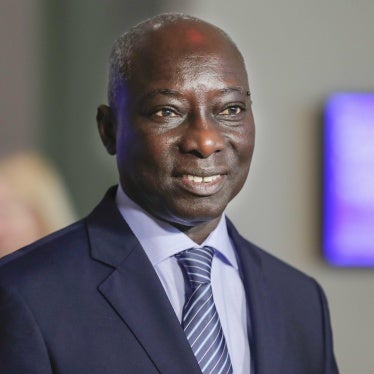Your Excellencies, Honorable Chairperson, Honorable Commissioners, all distinguished participants, and guests present,
We welcome this opportunity to engage with the African Commission on Human and Peoples’ Rights (African Commission) during its 77th session.
Despite improvements on several rights issues across the continent, our organization seeks to highlight issues of concern that, we believe, should be closely monitored by your Commission.
Earlier this year, we published a report investigating how the forced displacement of the Chagossians, an Indigenous people from the Chagos Islands, by the United States of America and the United Kingdom, and the United Kingdom’s racial persecution and continuous blocking of their return, all amount to ongoing crimes against humanity. Addressing the persistence of crimes committed under colonial rule, the report further calls on those governments to provide full reparations, starting with Chagossians’ right to return. Reparations are an essential aspect of justice for the Chagossian people. Their forced removal from their islands, including loss of livelihood, has caused great suffering. We invite the Working Group on Indigenous Peoples and the African Commission at large to call for the redress of these historical and ongoing harms, recognize the Chagossians as an Indigenous people, and help the Chagossian community to rebuild their lives on their home islands.
In Tanzania, the authorities have resorted to unlawful tactics, including beatings, shootings, sexual violence, arbitrary arrests, and the downsizing of vital health and education services to forcibly evict Maasai communities from their land in Ngorongoro. The African Commission has rightfully raised concerns about the government’s inadequate consultation with affected communities, and emphasized that meaningful and inclusive participation by those communities should be at the heart of any conservation model. It is essential for the African Commission to continue to make specific and rights-respecting recommendations to the government of Tanzania to halt all forcible evictions and displacement of Maasai communities, to meaningfully consult with affected communities, and to ensure they respect the rights of affected communities to land, livelihood, and culture.
We remain deeply worried by the current rights and humanitarian situation in the Sahel, where non-state and state actors, including armed Islamist groups, national security forces, pro-government militias, and foreign mercenaries, flouted the laws of war by launching deadly assaults on civilians. The lack of accountability for serious crimes by all warring parties fuels violence and emboldens perpetrators to commit further abuse. Military coup leaders across the region continue to restrict fundamental rights, including to freedom of expression, constraining independent monitoring for all sorts of abuse.
In Rwanda, we published a full-length report documenting Kigali’s transnational repression, which consists in a wide array of tactics deployed by the Rwandan authorities and their proxies to target critics, real or perceived, abroad. Such tactics, that include physical violence such as killings and enforced disappearances, surveillance, misuse of law enforcement, online harassment, and vicious abuses against relatives in Rwanda, when used together, form a global ecosystem of repression aimed to muzzle dissenting voices and scare off potential critics. We would welcome a statement from your institution calling for a complete end to extraterritorial repression by African Union members, including Rwanda, and a continent-wide investigation into cases of attacks on Rwandans abroad.
The conflict in Sudan between the Sudanese Armed Forces (SAF) and the Rapid Support Forces (RSF) is of serious concern to Human Rights Watch. Since the conflict broke out, six months ago, the warring parties have continued to fight in densely populated areas, indiscriminately targeting civilians and civilian objects, destroyed essential infrastructure, notably healthcare, leading to the displacement of millions from the country’s capital and its sister cities. Heavy explosive weapon attacks continue as we speak. Warring parties are both blocking critical humanitarian access. In West Darfur, the RSF and allied Arab militias have targeted Massalit and other non-Arab communities, killing and injuring civilians, including fleeing women and children, and burned down towns. They have committed sexual and gender-based violence against women and girls, targeting them because of their ethnicity and at times for their activism. The gravity of these events requires urgent action by the ACHPR, including regular reporting on the situation. We hope the Commission will receive critical support to ensure a robust response to the situation, including from relevant governments, the African Union Peace and Security Council, and civil society.
We would like to thank the Commission, that ensures a vital mandate in favor of human rights across our continent, for the attention given to our statement and look forward to our continued collaboration.







